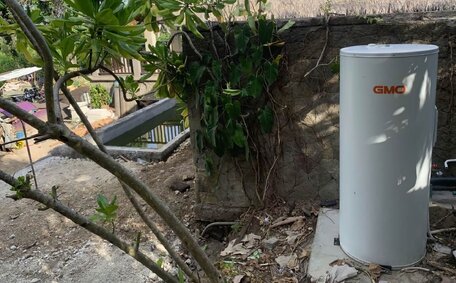
Financial Benefits of Natural Gas
Natural gas offers many financial perks over other energy sources. It burns cleaner and costs less than alternatives, helping lower monthly bills.
Read MoreNatural gas and liquefied petroleum (LP) gas leaks are hazardous. Promptly identify any hissing or whistling noises from gas appliances or lines, as these sounds may signify a leak.
Be aware of the distinctive sulphur or rotten egg scent deliberately added to gas for leak detection.
If you suspect a leak, avoid turning on or off electrical switches or appliances to prevent sparks or open flames that could trigger when the gas is not shut. Open windows to ventilate if safe and turn off gas hot water heaters if necessary. Then use the main valve at the meter to shut off the gas, contact emergency services, and evacuate the building if necessary.
In a majority of homes, your gas meter is equipped with a safety shutoff valve and is positioned externally, often adjacent to the point where the gas line reaches the premises. This feature allows you to quickly shut off gas to your home in the event of a leak or emergency.
You’ll generally locate the gas meter on an exterior wall or concrete pad. It’s a metal enclosure that includes dials, valves, pipes, and your gas supplier’s details, central to shutting off gas in emergencies.
Adjacent to the meter, find the gas shutoff valve and turn the handle 90 degrees clockwise to stop the gas supply.
For individual appliances like water heaters and gas stoves, each unit will also have its own shutoff valve located nearby. These valves can also control the flow of gas directed only to that specific appliance.
Familiarizing yourself with the locations of your gas appliances’ shutoff valves before an emergency can expedite your response. Valves can only be effective if they are clearly marked, easily accessible, and fully functional for your home gas system. If you encounter any difficulties in locating or operating these valves, contact a professional gas fitter for assistance.
When performing an emergency gas shutoff in your home, be mindful that any naked flame can ignite leaking gas, transforming the situation into a fire emergency. Avoid using flames, operating electrical switches, unplugging appliances, or using phones. Also switch off all your gas appliances including hot water heaters and pilot lights beforehand if possible.
Identify and shut off your gas by using the shutoff located at your meter outside your residence. Do not use excessive force or tools.
Gently use both hands to grasp the valve handle and rotate it clockwise 90 degrees until it’s perpendicular to the pipe, thus stopping the gas flow.
After closing the main gas shutoff valve, make sure to shut off all gas appliances, such as stoves and heaters. Ensure that pilot lights are off and shut down the gas water system if it’s safe. Ventilate the area by opening doors and windows while awaiting assistance.
If you suspect a leak and can’t safely access the meter valve to stop the gas, evacuate immediately and call your local emergency number from a safe distance as gas may still be flowing.
Once you’ve turned the emergency shutoff valve to the off position, verify that gas and water flow have ceased by checking:
Once the gas supply from the main is off, keep all appliances turned off until a licensed gas technician can inspect for leaks and safely reignite pilot lights. Assume all fittings are hazardous until given the all-clear.
If you can smell gas, hear sounds of escaping gas, or appliance pilots remain lit, move away as it suggests that the shutoff was unsuccessful and that gas may still be flowing in your system. Evacuate immediately and call emergency services from a safe location.
Following a successful shutdown of the gas supply, ventilate the area thoroughly by opening doors and windows when safe to do so. This helps residual gas fumes evacuate. Strictly refrain from turning any electrical devices or switches back on until given the all clear.
If at any point you feel unsafe remaining inside or smell lingering gas, evacuate immediately and only return once emergency services determine it’s secure. Call 000 if the situation seems dangerous, unstable or you are unsure of your safety.
After shutting off the gas, contact your gas provider or a licensed professional like Balmain Plumbing on 1300 349 338 for a detailed inspection. We have advanced gas leak detection equipment to accurately pinpoint any leaks and can then carry out repairs. We’ll also reignite your appliances’ pilot lights and confirm it’s safe to resume the use of gas supply in your home.
Discover on our website how our skilled professionals guarantee fail-safe connections for your peace of mind. Our services include full gas installations and line replacements, all preceded by meticulous checks.
Our team at Balmain Plumbing are your licensed plumbers and gas fitters, reachable via email address or on-call 24/7 for emergency situations in the local area. If in doubt, reach us immediately on 1300 349 338. Never hesitate to call 000 either if safety is at risk.
DIY attempts at repairing gas pipes without the proper expertise can lead to further leaks and safety hazards. Our technicians employ specialised equipment to precisely identify and fix the source of leaks. We also offer scheduled maintenance checks for early leak detection.
Regularly monitor your gas appliances to avoid neglect that could put your family at risk. Depend on Balmain Plumbing, the dependable choice for expert plumbing, leak detection, and gasfitting services.
Creating an emergency plan for potential gas leaks is crucial for safety. Ensure every household member is adept at identifying gas leak indicators, such as sulphur odours or hissing sounds, as well as the symptoms of carbon monoxide exposure.
Ensure everyone knows the precise locations of your gas meter, emergency shutoff valves, and pilot light switches on appliances. Confirm that these are well-marked and accessible for quick turns during emergencies. Ensure all your emergency contact details are posted nearby for easy access.
Consider installing audible carbon monoxide detectors for extra safety. Also have gas appliances inspected yearly and upgrade old pipe infrastructure when possible.
For gas safety tips and emergency planning advice, contact Balmain Plumbing at 1300 349 338. We provide assessments to detect leaks promptly and suggest preventive actions.
Natural gas offers many financial perks over other energy sources. It burns cleaner and costs less than alternatives, helping lower monthly bills.
Read MoreChoosing the correct hot water system size involves considering factors like number of household members, number of bathrooms, peak usage times and daily hot water needs per person. Our guide helps determine the right system capacity.
Read MoreHaving trouble with your gas water heater not heating properly? The pilot light may have gone out. Follow our clear guide on relighting your gas water heater’s pilot light in 6 easy steps. Or call the friendly experts at Balmain Plumbing if you need assistance relighting your pilot.
Read MoreBalmain, 2041 NSW
We will call back as soon as possible.




